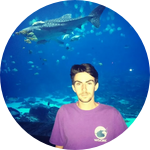About This Project
Whale sharks are known to mostly feed on many kinds of plankton, however when conditions are right whale sharks also feed on fish. Considering fish are more mobile, why do whale sharks exert effort to feed on prey more difficult to capture than plankton? Waters surrounding Bahia de Los Angeles, Mexico are home to whale sharks that have been observed feeding on fish. New observations will be made to try to understand hunting strategies whale sharks use to capture fish.
Ask the Scientists
Join The DiscussionWhat is the context of this research?
In places like Utila, Honduras it has been found that small fish comprise a larger part of the whale shark's diet than expected out of a filter feeding shark species that can more easily feed on plankton. Similar phenomena have been observed in Djibouti, Philippines, Australia, and more. Whale sharks across the globe may have discovered ways of capturing mobile fish prey. Learning how whale sharks hunt mobile fish species like anchovies may reveal the importance these fish species hold in sustaining a healthy whale shark population as well as fill the gaps in knowledge regarding hunting strategies.
What is the significance of this project?
Whale sharks are a highly sought after species for exciting wildlife encounters in many locations around the world. In order to protect whale sharks, it's critical to understand which prey species they rely on, which species they may associate with symbiotically, and what regions they inhabit that allow for these ecological events. Whale shark tourism also greatly benefits communities like Bahia de Los Angeles and many others that partly rely on whale shark ecotourism for their local economy.
What are the goals of the project?
Bahia de Los Angeles is known for a high frequency of whale shark encounters, therefore a collection of several hours of whale shark encounter footage can result. Ecological interactions that further describe ways in which whale sharks may rely on other species to help catch fish or rather how whale sharks cooperate with each other to accomplish the same task will hopefully be filmed. Frequency of occurrence will be noted for baitfish prey species as well as potential symbiotic predators like dolphins for all encounters. In addition, frame by frame analysis will be used to estimate swim speeds for species when possible which may suggest whale sharks rely on faster predators to do hunting work for them or whale sharks can accomplish this task alone.
Budget
The current budget covers a 2 month expedition in Bahia de Los Angeles working alongside the Vermilion Sea Institute marine conservation team. Several whale shark encounters are expected to occur daily, this funding will allow the team to make as many observations of hunting strategies and potential symbiotic relationship as necessary to answer the research question.
Endorsed by
 Project Timeline
Project Timeline
Project will begin in late August 2022 and proceed until late October 2022 with potential for a third month of observations. Once field observations are complete, scientific analysis and writing will follow with a final report and possible publication being given at University of Miami in May 2023.
Aug 30, 2022
Travel to Bahia de Los Angeles
Oct 10, 2022
Project Launched
Oct 31, 2022
Acquire all possible footage of unique whale shark feeding behaviors
Nov 07, 2022
Review all acquired video footage
Dec 15, 2022
Analyze selected footage for noteworthy behaviors, symbiotic relationships, swimming speed differences etc
Meet the Team
Affiliates
Patrick Lenihan
Lifelong marine biology enthusiast, current marine conservation masters student looking to shed light on the ecological mysteries surrounding whale sharks and other species in order to help humanity and nature to better coexist. Whale shark experiences and encounters in Utila, Honduras in 2016 have stuck with me and inspired further investigations into how whale sharks are able to opportunistically feed on baitfish as well as other ecological phenomena. Whale sharks became a focus thanks to their natural beauty and ability to introduce people from all backgrounds to the wonders of the ocean.
Project Backers
- 7Backers
- 67%Funded
- $3,236Total Donations
- $462.29Average Donation

